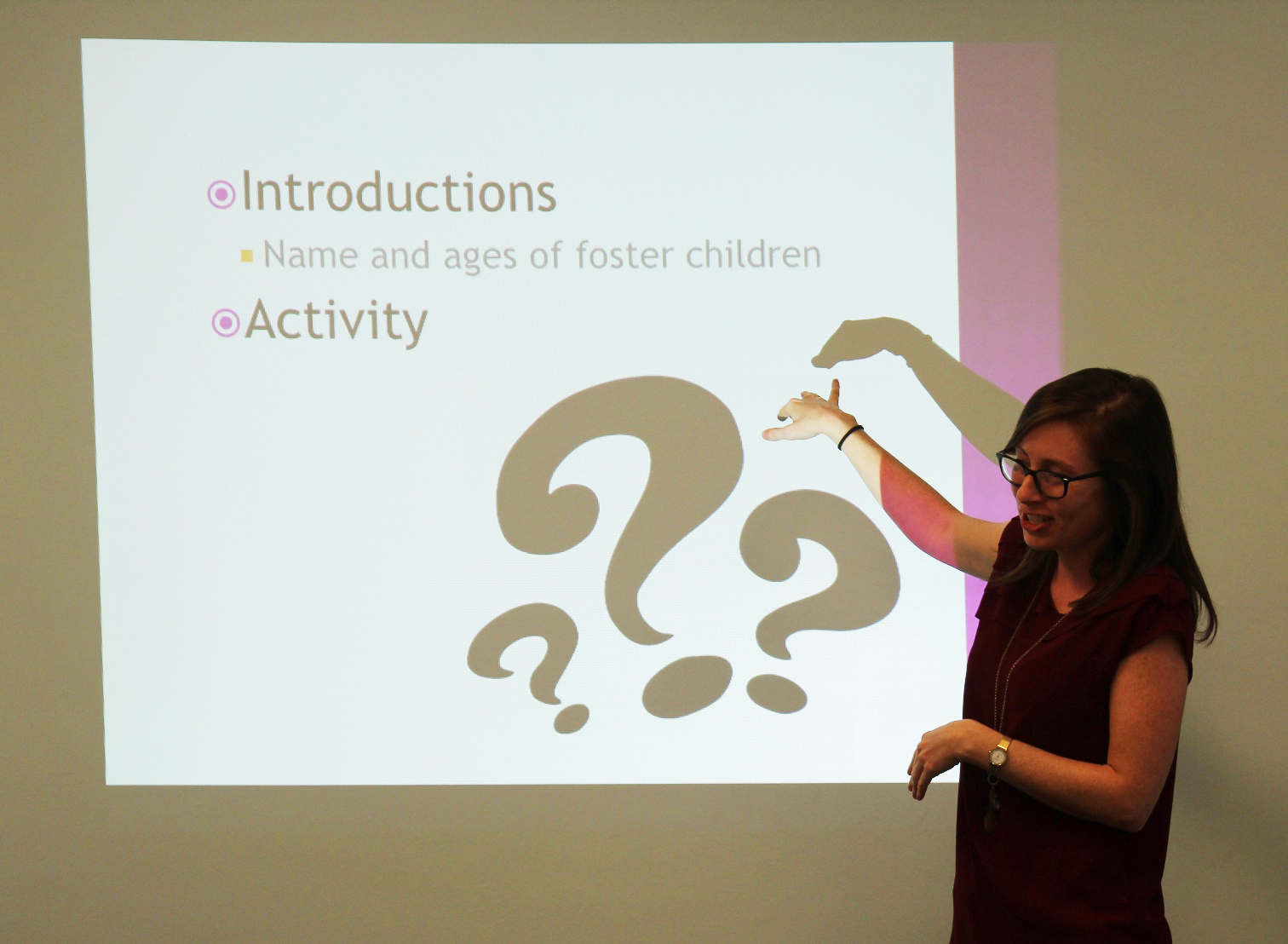Parenting Workshops
Exchange Family Center offers a variety of workshops to external groups for parents, caregivers, or community members. Your group can learn how to deal with challenging behaviors, help children cope with trauma, become an advocate for children in the classroom, and more.
Please see information on potential group workshop topics and pricing below. Any workshops open to individuals in the community can be found on our calendar of events.
You can also stay up-to-date on our public offerings by signing up for our newsletter.
Need Customized Training?
If you are interested in other training for parents or professionals at the Exchange Family Center, please contact us about your specific needs.
*Fees may apply for group trainings and/or workshops.
Family Support Program Workshops
Navigating Difficult Transitions
We will consider common ways kids respond to changes (loss of a family member, changing living arrangements, changing schools, new siblings, etc.) in their lives and offer concrete methods you can use to help transitions go as smoothly as possible.
Dealing with Defiance: Aggression, ADHD, and how to handle acting out
When children are aggressive, don’t listen, and ignore the rules, it’s easy to feel overwhelmed. Come learn strategies to successfully manage defiant children, including strategies you’ll be able to implement right away and information about where to receive more intensive support.
How to Buffer the Effects of Toxic Stress on Child Development: What you can do to help alleviate the impact of early trauma
We all experience stress – stress can be a motivator, an intimidator, or a brain changer. For young children the stress they experience and the responses they receive from the adults in their lives creates brain pathways and long term responses to the stressful moments in their life. At this workshop we will learn the science of stress and brain development; the reason foster children sometimes react the way they do and ways you can support their positive development.
Express Yourself! Fostering Language Development in Young Children
As children learn to express their needs, emotions, and preferences through language, their frustration and tantrums can decrease and their social relationships can improve. Communication skills are also an important building block for academic and social success. Come learn about the importance of language development, how to track your child’s language learning, and in what ways you can encourage language development as part of your daily routine.
Caring for Children with Emotional and Behavioral Problems
Is there a child in your home that gets really upset over the tiniest thing? Throws tantrums that seem never ending? Seems to need your constant attention? Is quiet, withdrawn, and hard to build a relationship with? All children cope with challenging experiences differently; some appear to be fine on the surface, some withdraw, and others show extreme emotional reactions or challenging behavior. The purpose of this training is help parents understand where the emotions and challenging behavior are coming from, and give some proven strategies to change the behavior for the better. (This workshop will be focused on children 0-10 years old.)
Child Development: Is This Behavior Normal? (1 to 8 years old)
What to expect at each stage for language, social skills, ability to follow directions, and other behaviors common at each stage.
Helping Your Foster Child Learn Self-Regulation Skills: Simple movement and breathing exercises to develop self-control
Do your children struggle to manage their emotions, have trouble calming down when upset or angry, seem to have little self-control, are impulsive, or seem to be bouncing off the walls? These kinds of behaviors can be frustrating and often illustrate an inability to self-regulate. This workshop will be an opportunity to learn more about self-regulation and to get some fun, concrete suggestions of things you can do to help.
Is This TMI (too much information)?
What is appropriate to share with children, in what way, at what ages: It can be hard to know what, when, and how to share difficult information with children about their past, their parents, or other family issues. This workshop will offer guidelines for what’s developmentally appropriate, and how and when to give children accurate information in a way that they can handle and understand.
Helping Your Child to Thrive: Finding Services and Activities to Address Needs and Foster Talents
In this workshop, you will get an overview of resources available for children and teens in Durham. You may be identifying children who have many needs – for education, therapy, camps, and extracurricular activities. By helping children to connect with the most appropriate resources, you are not only helping them to have meaningful experiences, but are increasing their sense of competence and connectedness to other people, which can have a lifelong positive impact. In this workshop, we will briefly explain how community resources can be protective factors that buffer children from the impact of some of their negative experiences. We will then complete an exercise to determine what resource the children you serve need the most, and examine as a group several guides to community resources in Durham.
Other Possible Topics:
Self-Care for Parents
Building the Baby Brain: How to give your baby everything he/she needs in the first year (up to 18 months old)
Taming Your Toddler: Get cooperation from your toddler and learn how to enjoy the “terrible 2s” (1 and 2 year olds)
Preschooler Power Strategies: What to teach them now so they will be ready for kindergarten — and surprisingly no, it’s not ABCs and 123s (3 and 4 year olds)
The Challenges of the Elementary School Years: Following directions, homework, sibling rivalry, and making friends (5 to 8 year olds)
Living with Your 9 to 12 Year Old: Handling the transition from childhood to adolescence (9 to 12 year olds)
Child Proofing Your Home: There’s more to safety than outlet plugs (Birth to 5)
How Your Stress Affects Your Kids (even when you don’t mean for it to) and What You Can Do About It?
When Your Child Gets Sick or Hurt: Knowing what’s an emergency, what needs a call to doctor, and when (and how) to treat at home
The Importance of Play: How to use it to make your child smarter, calmer, and better at following directions
Strategies for Smoother Bedtimes
The Best Ways to Get Kids to Really Listen and Follow Directions
Navigating DSS: How to advocate for yourself and your children if you get reported to the Department of Social Services
Routines and Traditions to Build Stability (No Matter What Life Throws Your Way)
How to Involve Your Child’s Father/Step-Parent/Grandparent: Making the most of their relationship with your children, even if you’re relationship with them isn’t great
My Children Embarrass Me in Public: How to be confident in your parenting, even when others are watching
Sibling Rivalry: How to help your children get along so you can stop being the referee
Children and Screen Time: The good, the bad, and the ugly
Parenting of Adolescents Workshops
What to Expect from My Medication
A workshop for parents and teens about diagnoses and commonly prescribed and medications, what to expect, effects, and side-effects.
Communicating with your Teen
Ever feel like you need to scream, yell, or curse at your child to get them to listen? This workshop will discuss different ways to communicate effectively with your teen so that they will listen and respect you.
Help, My Kid is Smoking and Using Other Drugs
Substance use is no longer limited to marijuana, but also addiction to medications prescribed to teens and their parents. This workshop will cover the impact of various substance use disorders and substance abuse on teens development and health.
Social Media?!?
SnapChat, Kik, Facebook, Instagram. What should parents know about Social Media and how today’s teens use these platforms.
The Struggle is Real
Parenting teens is difficult and often results in power struggles. This workshop will discuss strategies in regaining power in your home.
Self-Care for Parents
This workshop is to help parents to find ways to care for themselves despite busy schedules.
How to Talk to your Kids about Sex
Today’s youth learn a lot about sex from the media, friends and social media, but it is best when it comes from you. This workshop will cover ways to talk to your kids about sex.
Assertiveness for Teens
Life can be hard as a teenager, learn ways to stand-up to everyday pressures and communicate what you really mean.
Self-esteem Building for Teens
Help your teen to find the inner-awesome inside of them.

